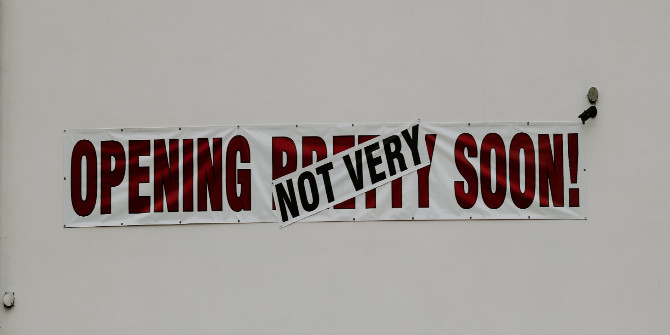 The five years since the financial crisis have seen faith in democratic institutions fall to dangerously low levels, precisely at the moment when David Blunkett MP argues that we need politics (and politicians) more than ever. We must urgently address the question of how political life can be revitalised in a way which avoids the twin dangers of extremism and technocracy.
The five years since the financial crisis have seen faith in democratic institutions fall to dangerously low levels, precisely at the moment when David Blunkett MP argues that we need politics (and politicians) more than ever. We must urgently address the question of how political life can be revitalised in a way which avoids the twin dangers of extremism and technocracy.
Few among us have been untouched by the major changes of the past five years. The crash that unfolded from 2008 saw jobs lost, an enormous rise in the cost of living, and economies retracting and failing across Europe (including our own).
It was in the United Kingdom that we could see most visibly both the problem for, and the failure of, traditional political action. The inability to save the rest of the economy from the shortcomings of both domestic and international banking would have been totally catastrophic. The failure was not the actions taken but, paradoxically, not explaining that this was one moment of our recent history where political democracy was in the ascendant, essential to saving us from those very unaccountable forces which exercise such overwhelming power.
But the last five years of political and economic turmoil has resulted in politics and politicians losing trust and confidence by the people on whose behalf action is taken.
Faith in democratic institutions has fallen to dangerously low levels, as demonstrated in the 2012 Audit of Political Engagement by the Hansard Society. Their survey revealed the proportion of the public who say they are ‘very’ or ‘fairly’ interested in politics has dropped by 16% and now stands at 42%, falling below 50% for the first time since the audits began.
This is problematic in two ways. First, a widespread disengagement with the political process aids extremist candidates. Demagogues will always seek to exploit those people frustrated by the mainstream parties who seem unresponsive to their concerns, but the success of George Galloway in Bradford West in March 2012 was a warning that we must not be complacent.
Second, it gives rise to ‘technocrats’. It could be described as nothing short of a coup in terms of what occurred in Greece, with the removal of the Prime Minister, and in Italy, with the removal of both the Prime Minister and the Cabinet.
Britain is not exempt from this growing trend. Peter Kellner, President of YouGov, tested in spring 2012 the proposition ‘Britain would be governed better if our politicians got out of the way, and instead our ministers were non-political experts who knew how to run large organisations’. Almost as many people agreed, 38%, as disagreed, 43%.
But it is at this moment we need politics and, dare I say it, politicians more than ever. Both to articulate the language of priorities, as described by Aneurin Bevan, but also to mediate and decide between contradictory demands from the public and short term pressures alongside long term imperatives. How much should we cut spending; do we need to raise taxes; how do we structure our health and education systems – making progress on these complex issues can be met only by elections, political engagement and democracy.
So how can politics can re-establish itself? The first step is to be honest with the public. Politicians’ habits of deceit and dissembling have exacted a terrible toll.
The next stage is to make politics relevant to ordinary people’s lives again. Arcane debates, like those about constitutional reform, are bound to alienate voters. The job is to show the political process can be a real tool for improvement, through challenging the might of the big institutions that have let down the public so badly.
Yes, politics will always be messy, as Bernard Crick taught me. But we should never allow it to become divorced from people’s lives. For that way leads to the death of democracy.
Politics as Theory and Politics as Practice, by David Blunkett MP is available to download online from Political Quarterly, Volume 83, Issue 4. In Defence of Politics Revisited, the full pamphlet by David Blunkett MP with a foreword by Ed Miliband MP, is available in full on his website.
Note: This article gives the views of the author, and not the position of the British Politics and Policy blog, nor of the London School of Economics. Please read our comments policy before posting.
David Blunkett MP is Member of Parliament for Sheffield Brightside and Hillsborough. His political career dates back to his election as a councillor in Sheffield at the age of 22, his leadership of the Council in the 1980s, and his election to Parliament in 1987. After serving on the Shadow Cabinet, he became Education and Employment Secretary in 1997, Home Secretary in 2001, and Work and Pensions Secretary in 2005. Since leaving government, in addition to completing his diaries, “The Blunkett Tapes”, David has undertaken a series of major pieces of work. In September 2012 he published In Defence of Politics Revisited, where he set out a range of proposals to increase faith in, and improve the working of, democratic politics.








Do you think that envy of China’s spectacular economic growth may now be one of the biggest threats to democracy? Think of it as the 21st-century version of “Mussolini made the trains run on time”…